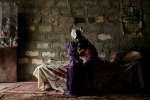World Refugee Day: Iraqi musician raises USD 24,000 for UNHCR programmes
News Stories, 18 June 2008

DAMASCUS, Syria, June 18 (UNHCR) – Acclaimed Iraqi oud (lute) player Naseer Shamma has raised more than USD 24,000 for UNHCR's Iraqi refugee programme with a concert at the Damascus Opera House to mark World Refugee Day, which falls on Friday.
The take from Tuesday's concert will be used to provide financial support for 150 of the most vulnerable Iraqi families in Syria over a month-long period.
Sold out within two days of tickets going on sale, the concert featured new music that Shamma created to reflect the situation of Iraq and Iraqi refugees. The programme included musical dialogues with other performers from Iraq; different styles challenging and mingling, with wisps of music evoking Iraq's past.
"I am terrified that we are losing Iraq's culture. Its sense of oneness, its true being," Shamma said. "I am committed to supporting my people as human beings who have a lot of talent to offer and share."
At times Shamma played his six-string oud with one hand only, a technique he developed to remember Iraqis who had their hands cut off in the late 1980s during the autocratic regime of the late President Saddam Hussein.
After playing "Good Morning Baghdad," he called on the audience of 1,300 people to support UNHCR's Iraqi refugee programme, which is facing a funding crisis. "This support is a lifeline. We all need to do our best to gather people, gather friends to support Iraqi refugees."
In the past Shamma's music has been compared by musical critics to a political rally without words. Despite the standing ovation and the warm media reviews, Shamma worried that his work advocating for refugees could affect his music and oud playing.
"I play my music with more conviction, more strongly, but my mind is preoccupied with the problems of my people. I will not stop, but I am challenged with finding the time and space for my practice, my music," said the musician, much of whose work is inspired by his exile.
Shamma fled Iraq in 1993 when a friend warned him that his arrest was imminent. Several years earlier, he spent 170 days in prison followed by 50 days in hospital. He left Iraq the day of the warning and headed to the Jordanian capital of Amman.
Since then, he has only returned to Iraq once – he brought a group of doctors to Baghdad in 1997 to help children needing surgery. Shamma says he will only return to Iraq when there is real democracy and no sectarian divisions. "I need freedom for people in Iraq," he said after the concert.
As food and fuel prices rise and their savings dwindle, Iraqi refugees are becoming more impoverished. The worst consequences of this poverty are child labour, homelessness, children not attending school and early marriage. UNHCR's financial assistance programme targets this vulnerable portion of the refugee population – currently some 4,000 families receive help.
Since the beginning of 2007, the falling value of the US dollar has led to a USD 6 million dollar loss of support for the UNHCR programme in Syria. There is a funding shortfall of USD 61 million for the entire Iraq operation, covering Syria, Jordan, Lebanon, Egypt and Iraq.
By Sybella Wilkes in Damascus, Syria

































